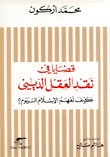محمد أركون
Professor Mohammed Arkoun (Berber: Muḥemmed Arkun, Arabic: محمد أركون), was an Algerian scholar and thinker of Berber descent. He was considered to have been one of the most influential secular scholars in Islamic studies contributing to contemporary intellectual Islamic reform. In a career of more than 30 years, he had been a critic of the tensions embedded in his field of study, advocating Islamic modernism, secularism, and humanism. During his academic career, he wrote his numerous books mostly in French, and occasionally in English and Arabic. he studied at the Faculty of Literature of the University of Algiers and at the Sorbonne in Paris (Agrégé in Arabic language and Literature, 1956 and Ph.D., 1968). He established his academic reputation with his studies of the history and philosophy of Ibn Miskawayh. As he began to consider how one might rethink Islam in the contemporary world, his questioning provided a counterpoint to the predominant interpretations of both the Muslim world and the non-Muslim West. As the editor of Arabica, he broadened the journal's scope, and played a "significant" role in shaping Western-language scholarship on Islam (source?). He is the author of numerous books in French, English and Arabic, including most recently: Rethinking Islam (Boulder, Colorado, 1994), L'immigration: défis et richesses (Paris, 1998) and The Unthought in Contemporary Islamic Thought (London, 2002).[2] His shorter studies have appeared in many academic journals and his works have been translated into several languages. He was decorated as an Officer of the French Légion d'honneur in July 1996. In 2001, Professor Arkoun was asked to deliver the Gifford Lectures, which enable a notable scholar to contribute to the advancement of theological and philosophical thought and was announced as the recipient of the Seventeenth Georgio Levi Della Vida Award for his lifelong contribution to the field of Islamic Studies.
